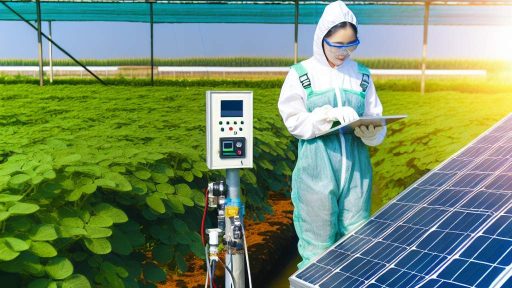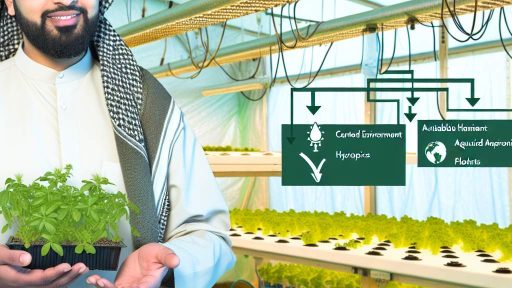Increased Crop Yield
How GM Crops Contribute to Higher Agricultural Productivity
Genetically modified (GM) crops play a significant role in modern agriculture.
They help farmers increase their crop yields significantly.
By enhancing resistance to pests and diseases, GM crops reduce losses.
Moreover, these crops can tolerate adverse environmental conditions.
This includes droughts and poor soil quality, leading to more reliable harvests.
Improved Resistance to Pests
Many GM crops are engineered to contain natural insecticides.
This innovation dramatically reduces the need for chemical pesticides.
As a result, farmers enjoy reduced costs and less chemical exposure.
Furthermore, pest-resistant crops lead to healthier ecosystems.
Beneficial insects and pollinators thrive without harmful chemicals.
Drought Tolerance
Drought-resistant GM crops minimize the impact of water scarcity.
Farmers can cultivate these crops even in low-water conditions.
This adaptability ensures food security during dry spells.
Additionally, it allows farmers to use water resources more efficiently.
Thus, they face less risk from climate variability.
Transform Your Agribusiness
Unlock your farm's potential with expert advice tailored to your needs. Get actionable steps that drive real results.
Get StartedHigher Nutritional Value
Some GM crops are biofortified to enhance nutritional content.
For example, Golden Rice is enriched with vitamin A.
Such crops address nutritional deficiencies in vulnerable populations.
Likewise, farmers can market these products at premium prices.
This results in improved income and health for communities.
Increased Efficiency in Resource Use
GM crops often require fewer inputs than conventional varieties.
This reduces the overall environmental footprint of agriculture.
Farmers can grow more food on less land, maximizing sustainability.
Efficient use of fertilizers and water supports environmental goals.
In essence, the increase in yields contributes to global food security.
Pest Resistance
Reducing Pesticide Use
Genetically modified crops often possess built-in pest resistance.
This trait significantly decreases the need for chemical pesticides.
Farmers can thus lower their production costs while promoting environmental health.
By reducing pesticide application, the risks associated with chemical exposure diminish.
Consequently, these crops contribute to safer ecosystems and healthier soil.
Minimizing Crop Loss
Pest resistance also plays a vital role in minimizing crop loss.
Crops like Bt cotton and Bt corn can resist specific plant-eating insects.
This resistance leads to higher yields compared to non-GM varieties.
Farmers experience increased profits due to less crop damage from pests.
Moreover, consistent crop production helps stabilize food supply chains.
Enhancing Farmer Productivity
With fewer pests, farmers can focus on other critical farming tasks.
This focus enhances overall productivity in their agricultural operations.
Farmers can allocate resources more efficiently, optimizing their efforts.
Additionally, time spent on pest management reduces significantly.
Showcase Your Farming Business
Publish your professional farming services profile on our blog for a one-time fee of $200 and reach a dedicated audience of farmers and agribusiness owners.
Publish Your ProfileThus, genetic modification enables modern farmers to work smarter, not harder.
Drought Tolerance
Importance of Drought-Tolerant Crops
Drought-tolerant crops are essential for modern agriculture.
They help farmers cope with changing climate conditions.
Additionally, these crops minimize water usage drastically.
Farmers can thus maintain productivity even during droughts.
How Genetic Modification Works
Genetic modification enhances a plant’s natural drought resistance.
This process enables crops to retain moisture effectively.
Furthermore, scientists can introduce genes from other drought-resistant species.
As a result, these modified crops yield better and survive longer.
Benefits for Farmers
Farmers using drought-tolerant crops often experience higher yields.
They can also reduce irrigation costs over time.
This leads to greater sustainability in farming practices.
Moreover, farmers gain some flexibility with planting schedules.
Case Studies
Farmers in California have implemented drought-tolerant corn varieties.
These crops outperform traditional varieties under limited water conditions.
In South Africa, drought-resistant soybeans show similar advantages.
Such case studies illustrate the tangible benefits of genetic modification.
Future Implications
Investing in genetically modified crops will become increasingly important.
As climate change intensifies, droughts will likely become more common.
Farmers must adapt to ensure food security globally.
Drought-tolerant crops represent a viable solution to this challenge.
Find Out More: IoT-Driven Data Analytics for Farm Productivity
Nutritional Enhancement
Improving Food Quality
Genetically modified crops offer significant nutritional benefits.
They often contain enhanced levels of vitamins and minerals.
For example, golden rice has increased levels of beta-carotene.
This vitamin A precursor can combat malnutrition effectively.
Moreover, science has modified other crops for essential nutrients.
For instance, iron-fortified beans address deficiency issues globally.
Benefits extend beyond basic nutrition to include health improvements.
These crops can be engineered to produce healthier oils.
As a result, they may lower cholesterol levels in consumers.
Additionally, genetically modified crops can resist certain diseases.
This reduced reliance on pesticides may yield healthier foods.
In essence, these crops contribute positively to public health.
Farmers can play a crucial role in this advancement.
By choosing genetically modified options, they enhance food quality.
Furthermore, their decisions support sustainability in agriculture.
The nutritional potential of these crops is immense.
It ultimately benefits farmers, consumers, and the environment alike.
Delve into the Subject: Drones For Efficient Irrigation Management In Farming
Showcase Your Farming Business
Publish your professional farming services profile on our blog for a one-time fee of $200 and reach a dedicated audience of farmers and agribusiness owners.
Publish Your ProfileReduced Environmental Impact
The Ecological Benefits of GM Crops in Farming Practices
Genetically modified (GM) crops offer significant ecological advantages.
First, they require fewer chemical inputs, which reduces environmental contamination.
Farmers can use less pesticide and herbicide on GM crops.
This reduction helps maintain healthier ecosystems surrounding farms.
Moreover, GM crops can be engineered for pest resistance.
Consequently, they decrease the likelihood of pest outbreaks in nearby crops.
In addition, GM crops typically exhibit improved drought tolerance.
This trait allows farmers to conserve water effectively.
As a result, water bodies are less likely to experience depletion.
Furthermore, these crops are often more nutrient-efficient.
This efficiency leads to higher yields without overusing soil nutrients.
Subsequently, soil health remains intact over successive planting cycles.
Enhancing Biodiversity
GM crops also contribute to enhanced biodiversity in agricultural landscapes.
By reducing the need for chemical interventions, they support beneficial insects.
These insects play vital roles in pollination and pest control.
Additionally, diverse planting can help mitigate soil erosion.
GM crops allow for improved crop rotation practices.
With diverse crops in rotation, soil microbial diversity increases.
Hence, a healthier soil ecosystem promotes overall fertility.
Carbon Footprint Reduction
Another significant advantage lies in the potential reduction of carbon footprints.
GM crops can increase carbon sequestration in the soil.
This occurs due to improved root systems and biomass levels.
Additionally, reduced fertilizer use helps lower greenhouse gas emissions.
Consequently, farmers engaged in GM crop production often benefit environmentally.
Discover More: Precision Irrigation Systems Enhancing Sustainable Farm Practices

Economic Advantages
Cost Savings
Genetically modified (GM) crops often require fewer inputs than traditional crops.
This reduction in inputs leads to lower overall production costs.
Farmers experience significant savings on pesticides and herbicides.
Additionally, GM crops can be engineered for pest resistance.
This pest resistance decreases the need for chemical applications.
Moreover, farmers can save on fuel costs through reduced machinery use.
Increased Profitability
Higher crop yields directly translate into improved profitability for farmers.
Many GM crop varieties exhibit enhanced resistance to disease and drought.
This resilience allows farmers to maintain production even in adverse conditions.
Consequently, they can sell more produce at market rates.
Furthermore, the longer shelf life of some GM crops increases marketability.
Market Demand
Consumer acceptance of GM crops is increasing in many regions.
This rising acceptance expands market opportunities for farmers.
Additionally, farmers can access premium markets with specialty GM crops.
These premium markets often offer higher prices, boosting profits.
Showcase Your Farming Business
Publish your professional farming services profile on our blog for a one-time fee of $200 and reach a dedicated audience of farmers and agribusiness owners.
Publish Your ProfileInvestment and Innovation
Investing in GM crop technology fosters innovation within the agriculture sector.
Farmers who adopt advanced practices can stay competitive in the market.
This technological edge allows for continuous improvement in crop production.
Ultimately, successful farmers will thrive in an evolving agricultural landscape.
Gain More Insights: Economic Advantages Of Growing Genetically Modified Crops
Access to Diverse Markets
Expanding Market Opportunities
Genetically modified (GM) crops significantly broaden farmers’ market potential.
They enable access to a variety of market segments, both domestically and internationally.
This access occurs because many consumers prefer GM crops for their enhanced traits.
As a result, farmers can target niche markets that favor specific GM products.
Improving Trade Relations
GM crops also play a vital role in international trade dynamics.
Countries that embrace GM technology often see improved trade relations.
Importing nations may seek to establish agreements that support GM crop exports.
By meeting international standards, farmers can enhance their trading capabilities.
Diverse Crop Options
The introduction of GM crops leads to a wider range of planting choices.
Farmers can select crops based on resistance to certain pests or diseases.
This diversity ensures that farmers can adapt to market demands more efficiently.
Additionally, GM crops typically offer higher yields, boosting profitability.
Consumer Acceptance and Preferences
Consumer acceptance of GM products has been increasing globally.
Educated consumers often prioritize sustainability and efficiency in agriculture.
This trend means that farmers using GM crops can appeal to ethically-minded shoppers.
Consequently, this consumer preference strengthens market access for farmers.
Market Access and Benefits of GM Crops
Farmers benefit from GM crops by tapping into diverse markets and trade opportunities.
With these crops, they can enhance profitability and meet changing consumer demands.
Sustainability in Agriculture
Long-Term Farming Viability
Genetically modified crops enhance sustainability in agriculture.
They increase crop yields while reducing environmental impacts.
Farmers can grow more food on less land.
This efficiency helps conserve natural resources.
Additionally, GM crops often require fewer pesticides.
As a result, the use of harmful chemicals decreases.
Consequently, biodiversity in surrounding ecosystems improves.
Resilience to Climate Change
Genetically modified crops are engineered for resilience.
They can withstand extreme weather conditions.
This includes droughts, floods, and temperature fluctuations.
By adapting to changing climates, they secure harvests.
Farmers like Elena Rodriguez benefit from these innovations.
Her corn yields are consistently high, even in adverse weather.
Moreover, this technology provides stability to farmers’ incomes.
Efficient Resource Use
GM crops utilize water more efficiently than traditional crops.
This is crucial in arid and semi-arid regions.
Consequently, farmers can allocate water to other needs.
Showcase Your Farming Business
Publish your professional farming services profile on our blog for a one-time fee of $200 and reach a dedicated audience of farmers and agribusiness owners.
Publish Your ProfileFurthermore, genetically modified plants often have deep roots.
These roots access nutrients and water more effectively.
As a result, soil health and fertility improve over time.
Reducing Agricultural Footprint
Sustainable farming practices reduce the agricultural footprint.
GM crops require less land, water, and pesticides.
Also, they lead to lower greenhouse gas emissions.
Farmers like Michael Chen appreciate these benefits.
His farm has lowered its carbon footprint significantly.
Moreover, they contribute to cleaner air and water.
Economic Viability
Genetically modified crops offer economic benefits to farmers.
Higher yields translate to greater profits for agricultural businesses.
Additionally, reduced input costs enhance overall profitability.
Farmers can invest savings into further improvements.
This leads to better technology and practices over time.
Consequently, rural economies flourish due to increased production.
Additional Resources
Genetically Modified Corn— Environmental Benefits and Risks – PMC




